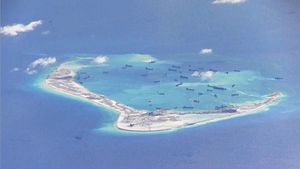Observers of Asian geopolitics are by now familiar with the legal challenge brought by the Philippines challenging China’s maritime claims in the South China Sea. Last year, the Permanent Court of Arbitration ruled that it had jurisdiction over the main claims brought by the Philippines, rejecting China’s argument that the case presented a territorial dispute beyond the purview of the Court. A ruling on the merits of the case, including a ruling of the legality of China’s “nine-dash line” is expected in May or June of this year.
The case is a landmark for international law as a force in geopolitics. The case is also a landmark for the Court, as it is arguably the highest profile case in its 117 year history. The case also will have a real impact on the region’s geopolitics if the nine-dash line is formally ruled illegal. But no one should be under the impression that this case will end the dispute over control of the South China Sea — far from it. In fact, the Court’s ruling on jurisdiction was written in such a way that protects some of China’s most controversial claims from the scrutiny of legal arbitration and ensures that maritime disputes in the South China Sea will continue. To understand why requires a precise understanding of exactly what the Court said in its ruling on jurisdiction and how China’s arguments in the case effectively narrowed any potential ruling to shield some of China’s most important claims from the Court’s reach.
China did not formally participate in the case, though it did publish a position paper that the Court treated as a brief. In its position paper, China argued that the Court had no jurisdiction over the nine-dash line because it is based on underlying claims to territory (namely, China’s claims to the island chains of the South China Sea) and the Court is expressly prohibited from deciding territorial disputes. Essentially, China argued that the Court could not rule on the legality of the nine-dash line because it did not have the power to decide the underlying dispute over control of the Spratly Islands.
China’s paper was right insofar as the Court can’t rule on a territorial dispute. China’s position paper forced the Philippines to find a legal argument that would allow the Court to rule on the nine-dash line without having to rule on the question of which party had the stronger claim to the Spratly Islands. The Philippines chose to argue that even if all of China’s claims to the islands of the South China Sea were accepted as legitimate, the nine-dash line would still exceed what China would be entitled to under the UN Convention on the Law of the Sea.
The Philippines argued that even if China’s claims to the Spratlys were accepted, they would still only have either 12 miles of territorial waters (the Philippine position) or a 200 mile exclusive economic zone (the Chinese position). In either case, China’s rights would not come anywhere near the claims made under the nine-dash line. The Court ruled that it had jurisdiction to decide on the legality of the nine-dash line because deciding this question did not require a ruling on who owned the Spratlys. The line would exceed China’s possible claims regardless of how the underlying territorial question was ultimately resolved.
The Philippines’ argument was a clever solution to a difficult problem, but it also reveals the limits of the Philippines’ lawfare strategy. Because the question of who owns the Spratly Islands had to be removed from the Court’s consideration, none of China’s claims to these islands will be dented at all by the outcome of the case. This means that even if, as is expected, the Court rules the nine-dash line exceeds any plausible Chinese claims under international maritime law, this won’t end the dispute in the South China Sea. China would still be claiming to own the Spratly Islands.
China’s arguments in its position paper didn’t stop the Court from hearing the case but they did get China’s position heard without having to acknowledge the legitimacy of the court’s proceedings. It was also effective in shaping the terms of the debate before the Court. China has managed to ensure that even if the Court strikes down the nine-dash line, many of China’s other claims will survive. Further, China has essentially gotten the Court to admit it has no jurisdiction to ever decide China’s claims to the Spratly Islands. This ensures that China’s ambitious efforts to militarize the islands will continue and the dispute in the South China Sea won’t ultimately be settled in a courtroom.
John Ford is a Captain in the US Army JAG Corps and now serves as a reservist. He holds a J.D. and LL.M. and practices with the California law firm Collins Collins Muir + Stewart LLP.
































